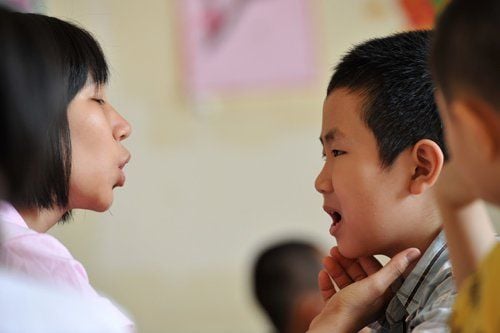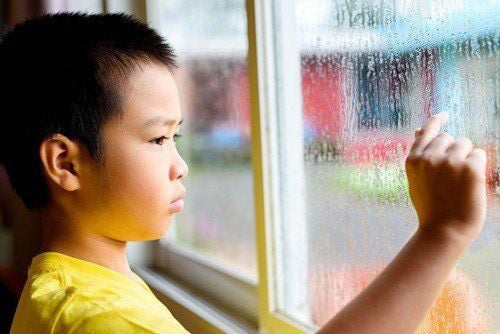This is an automatically translated article.
Practicing language skills is an extremely important stage for children from 2-6 years old. However, there are many children who are old enough to learn to speak often with a stutter and a wrong pronunciation, which makes many parents extremely worried. The following article will help parents clarify how to properly deal with their children's lisp and tips to support early treatment.
1. Overview
What is lisp? Lisp is a speech disorder that occurs most often in children (especially children who are just beginning to learn to speak).
The process of learning to speak normally goes like this:
Children at 2 years old: practice saying the correct sounds b, m, d, n, h, g, c Children from 3-4 years old: ch, t, d , v, ph, nh, ng, x Children from 5-6 years old: kh, s, th, r, tr The period from 2 to 6 years old is an important period for children to practice pronunciation like adults. In order to reach a certain level of maturity, children will have to go through many "mistakes" at the beginning such as stuttering, slurred speech, unclear pronunciation of words. However, over time, through learning and imitating parents, people around, and as the child's jaw, lip, teeth, and uvula... gradually develop, the above conditions will gradually improve. children's words will become clearer and clearer.
Therefore, if you see children talking too much at an early age (2-4 years old), parents should not be too worried. It is only necessary to confirm that the child still has normal hearing and has no abnormalities in the oropharynx.

Một số trẻ ngậm núm vú giả nhiều có thể khiến trẻ nói ngọng
2. Causes of child stuttering
Children 2 years old when they first start to talk, it is completely normal to stutter, but if it is still not corrected by 6.7 years old, it is considered abnormal, parents need to find out more about the cause and find how to fix. According to some literature and pediatric research, there are many reasons why children have defects in language development such as:
Some children suck on pacifiers a lot, if they stretch their tongue, they tend to stick out. . So, after pronouncing, children tend to push their tongue out (tongue thrust) out of habit, causing the sound to be deflected. Speech disorders can also be the result of behavioral disorders. Many children at a young age were allowed to play games and watch too much TV, leading to a state of language learning not through hearing, speaking but through seeing and speaking, making the auditory arch not stimulated and developed properly. These children, in addition to lisp, are easily agitated and angry. Children tend to imitate the voices of others, especially those of their family or friends in class. Therefore, if they come into contact with unknown speakers, children with incorrect pronunciation are likely to make the same mistakes. Some children with diseases affecting the vocal tract such as sinus disease, VA ... are also more prone to lisp than other children. Children with a number of physical injuries such as: deformity of the pronunciation line, short tongue (short tongue brake), cleft lip and palate, cleft palate, mouth damage... are also causes of lisp. Children may also slurred speech due to a problem with their hearing (hard of hearing). Children with hearing loss may not hear enough words to learn to speak fully, becoming deaf (similar to deaf people are susceptible to mute complications). Depending on the cause, the child's lisp will be examined by the doctor and will have instructions to intervene in the child's lisp accordingly.
SEE ALSO: Teach children to speak, pay attention to early detection of signs of language disorders

Giúp trẻ nói rõ hơn bằng cách luyện phát âm chuẩn
3. How to treat children with early lisp?
For some reason, some children up to 6-7 years old still can't pronounce correctly, this causes some effects as follows:
Children have difficulty catching up with people around them. Children are psychologically affected, easily self-deprecating, depressed because they do not pronounce "like" everyone. Children are increasingly embarrassed, embarrassed to express their views to others (especially to strangers). The lisp can affect a child's learning ability (especially reading and writing skills), making it difficult for children to learn both Vietnamese and foreign languages. The above consequences can make many parents concerned and worried. However, the intervention of children with lisp is not too difficult as many people think. Parents can refer to some ways to treat children with early lisp as follows:
Regularly listen and compare the child's language ability with peers to identify early signs of abnormalities. Set an example for children by always speaking clearly and with correct pronunciation when talking to them every day. When talking with children, if a child says a word wrong, repeat the word in the correct way, repeating it in different contexts so that the child can practice listening naturally, not forcing the child to repeat. Avoid parody, talk along with the silly words of children. Since children learn to speak by imitating sounds they hear, it is not advisable to teach them to imitate false sounds. Never tease or disparage the child's voice. Instead, you should listen to the child with a positive attitude, encouragement, and proactive praise when the child shows effort in learning pronunciation. Help your child speak more clearly by using short sentences, breaking sentences or repeating suggested sentence patterns. In the process of treating children with early lisp, parents should prepare psychologically that learning to speak is not a matter of a day or two, but it takes time to practice and practice regularly for a long time. Therefore, perseverance when guiding is very necessary.
Intervention for children with lisp, if not conducted early so that the condition lasts until the child is older, will cause many serious problems (psychological, learning ability, communication...). Therefore, parents should not subjectively ignore this error. If home treatment does not improve, parents should consider sending their child to a medical facility with a specialty in speech therapy. Here, the doctors will examine the pronunciation structures, find out the reason why the child says wrong and find ways to guide the child to pronounce correctly.
For children to be healthy and develop well, it is necessary to have a nutritious diet in terms of quantity and quality balance. If children are not provided with adequate and balanced nutrients, it will lead to diseases of excess or lack of nutrients, which adversely affect the comprehensive development of children in terms of physical, mental and motor skills.
Parents should supplement their children with supportive products containing lysine, essential micro-minerals and vitamins such as zinc, chromium, selenium, and B vitamins to help fully meet their child's nutritional needs. At the same time, these essential vitamins also support digestion, enhance nutrient absorption, help improve anorexia, and help children eat well.
Parents can learn more:
Signs of zinc deficiency in children
Micronutrient deficiency and failure to gain weight in children
Please regularly visit Vinmec.com website and update useful information to take care of your child. Take care of the baby and the whole family.













